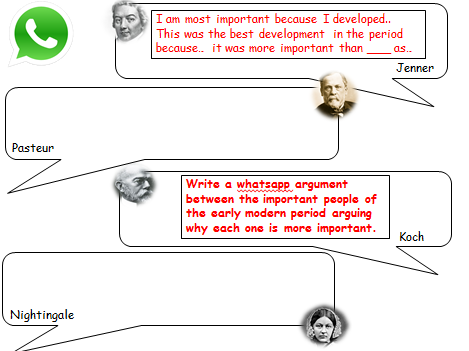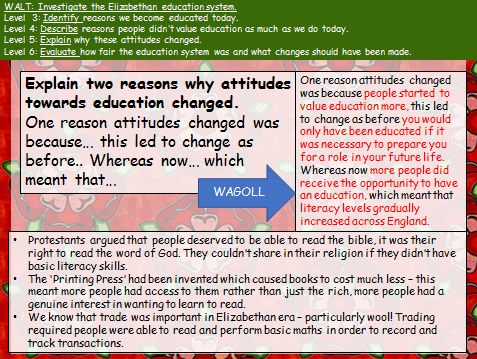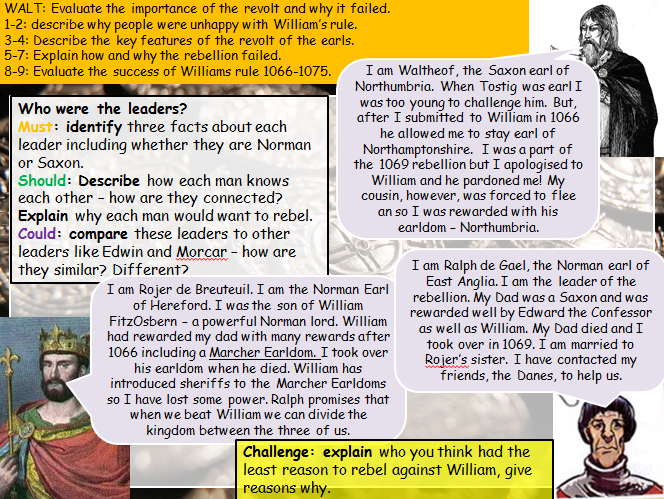
177Uploads
74k+Views
23k+Downloads
History

Titanic - who was to blame?
Group lesson, pupils work in groups to analyse sources which help them decide who was to blame for the disaster - they annotate each source before moving onto the next.
At the end of the lesson pupils are asked to evaluate who was most to blame, this task is levelled with different tasks for each attainment level.

Henry VIII Wives
Full lesson and homework. Pupils evaluate which wife Henry loved most by firstly completing a carousel activity that allows them to explore each wife and the reasons Henry divorced her before creating an extended writing piece (differentiated) about who he loved most.
Homework: to write a letter to the Pope explaining why you want a divorce from Katherine of Aragon.
WALT: Evaluate who Henry loved most.
Level 3: Identify Henry’s six wives.
Level 4: Describe each of his wives and what happened to them.
Level 5: explain why Henry divorced each wife.
Level 6: Compare which wife was Henry loved most, give reasons why.

Early Modern Medicine (1700-1900) Revision Session
This session covers
Jenner, Pasteur, Koch, Nightingale, Cholera (Chadwick and Snow) And the Public Health Acts.

Medieval Medicine Revision (Edexcel 9-1)
Session designed to last one hour and includes everything for medicine 1250-1500 cross referenced with the first chapter of the Pearson textbook.
Included is a worksheet for pupils to complete alongside the session.
Pupils cover:
causes of disease image starter
key words
theory of the four humours
miasma theory
different people that could treat you
treating the sick
hospitals
the Black Death 1348-1349

REVISION Succession crisis and events of 1066 (Anglo-Saxon and Norman England (Edexcel 9-1))
This is part of a series of revision sessions aimed at preparing pupils to succeed at the Edexcel 2016 specification: Paper Two Anglo-Saxon and Norman England.
As part of this session pupils will explore:
Succession crisis: who should be king?
Gate Fulford
Stamford Bridge
Hastings
Why did William Win
Aftermath: march on London, Submission of the earls

Elizabethan England: Events of the Spanish Armada 1588 (Narrative Account skills lesson)
WALT: Explain why Phillip launched the Armada
Level 3: identify key features of weapons used during the battle.
Level 4: describe the events of the battle in detail.
Level 5: Explain why Elizabeth won the battle.
Level 6-7: Evaluate the reasons for the victory and which part of the narrative was most important.

Controlling Religion (Weimar and Nazi Germany: Edexcel 9-1)
WALT: Analyse how far Hitler succeeded in controlling religion.
Identify Hitler’s early policy towards the Church in the Enabling Act.
Describe how Hitler hoped to control the Catholic and the Protestant Church.
Explain why not everyone accepted Hitler’s policies about religion.
Analyse a source to explain how useful it is to a historian examining the catholic response to Hitler’s reforms.
Task one: pupils examine a source from the Enabling Act explaining how Hitler wanted his relationship to look with the church and make an inference
Task two: Carousel activity - how did Hitler gain control of the church? was there any immediate opposition (covered in more detail in a church opposition lesson).
Task three: how far did Hitler succeed in controlling the church? discussion
Task Four: How useful question including structure to guide weaker pupils and key words to prompt focus on knowledge and judgement. Full mark answer accompanies so that you can go through expectations for the 8 mark question with pupils and allow them to self assess and improve their own work based on the example.

Elizabethan England: Tudor Entertainment
Whole lesson aimed at KS3 exploring Elizabethan/Tudor entertainment.
Pupils examine an image of bear baiting and infer what they think is happening
they read a source and add to/alter their description
they self assess it
they explore other types of entertainment
finally they apply their knowledge by creating a poster for a spectator-fest in their Tudor village
WALT: Explore methods of entertainment available in Elizabethan England. Level 3: Infer what you can learn from a source.
Level 4: Describe types of entertainment available in Tudor England.
Level 5: Explain why these sports were dangerous.
Level 6: Evaluate which sport was most popular and compare why you think this is the case.

Votes for Women! Suffragists and Suffragette’s interpretation lesson
stand alone lesson to celebrate the centenary of votes for women and to provide pupils with an overview of the subject.
Pupils describe the two groups (suffragists and suffragettes) and will gain an understanding of the words militant and moderate. Pupils will also be able to explain why women were not allowed the vote and eventually gained the vote following WW1.
Skills building section develops pupils ability to analyse interpretations.

Wounded Knee and Ghost Dance (American West (Edexcel history 9-1))
Whole lesson covers the ghost dance and the massacre at wounded knee.
Lesson fully differentiated with the opportunity for discussion as to why the Ghost dance would terrify white settlers and how they reacted to the massacre.

REVISION Life and problems in England (Early Elizabethan England (Edexcel 9-1))
Part of a series of lessons covering content required for the Early Elizabethan England module in the new Edexcel specification.
This lesson covers
Poverty and the poor laws,
education,
past times,
financial weaknesses
There are also opportunities embedded to develop the skills required to answer the 12 and 16 mark questions.

Elizabethan England: Education
A lesson that explores the education system fully differentiated with AFL for each task.
Pupils will:
Identify what education is like today and why it is seen as valuable
Describe why not everyone valued education in Elizabethan England
Explain why attitudes changed
Analyse the education system - was it fair?
Compare the similarities and differences to education today.

REVISION Stresemann and recovery (Edexcel 9-1: Weimar and Nazi Germany)
This lesson covers the content required for Stresemann and recovery of Germany after the first world war for Paper 3 of the new Edexcel specification (2016).
Pupils will explore both interpretations and source questions within this revision lesson.
They will be provided with a worksheet that covers all of the steps Stresemann takes to ensure Germany is able to recover following the TOV. They can then take this home to support independent revision.
Pupils will:
analyse the Stresemann as our saviour source
Highlight key changes made by Stresemann and explain why people did and didn’t like them.
Answer the two four mark interpretation questions and plan an explain why question.

REVISION Hitler's Rise to Power (Edexcel 9-1: Weimar and Nazi Germany)
This lesson is set to help pupils revise content surrounding Hitler’s rise to power in preparation for Paper 3 of the new edexcel specification (2016).
Pupils will:
Describe the Reichstag Fire
Analyse the reasons he rose to power - differentiated
Plan and answer (if time) a 20 mark interpretation question
Analyse how useful a source is

Revolt of the Earls 1075 (Anglo-Saxon and Norman England (Edexcel 9-1))
WALT: Evaluate the importance of the revolt and why it failed.
1-2: describe why people were unhappy with William’s rule.
3-4: Describe the key features of the revolt of the earls.
5-7: Explain how and why the rebellion failed.
8-9: Evaluate the success of Williams rule 1066-1075.

Modern Medicine Revision (Edexcel 9-1)
Session covers:
new technology, lung cancer, magic bullets, penicillin and the creation of the NHS
Pupils complete a worksheet whilst teacher leads the session

KS3 defeat of France (WW2)
Aimed at developing skills required for the GCSE reforms at KS4, this lesson encourages pupils to develop PEEL paragraphs for the explain two consequences question.
This is part of a scheme of work about WW2 - the rest of which can be found within my shop.
Pupils will:
Identify who Winston Churchill is as a hook to the lesson
describe why France surrenders using images to challenge them to think outside of the box
Use a WAGOLL to identify examination skills required and the structure of a PEEL paragraph
Use an information sheet (included) and the WAGOLL to structure their own PEEL paragraph explaining a consequence of the defeat of Poland.
Peer assess their work to reflect on their own progress within the lesson.
Bundle

What is History? KS3 introduction to history
This scheme of work has been created to introduce and embed historical skills across KS3.
Pupils explore key concepts such as chronology, bias, and interpretations before conducting their own investigation over a series of six lessons.
The seventh lesson of the series can be used as a baseline assessment and is in line with the interpretation skills included in Paper 3 (edexcel 9-1).

REVISION CLOCK ANGLO-SAXON AND NORMAN ENGLAND ( Edexcel 9-1: Anglo Saxon and Norman England)
The concept of a revision clock is that pupils spend five minutes completing each section - thus meaning they revise a large amount of a single topic in an hour.
this resource includes two revision clocks, i plan to provide my pupils with it printed double sided, they will complete one side in class and one side for homework.
I have based these clocks largely on the Pearson purple revision guides, the clock follows the pages from front to back.
Another technique is to ask pupils to fill out what they know in one colour, and then use a second colour to revise using a revision guide or textbook, giving them a colour coded guide to what they need to focus their revision on.

American West Consequences Revision (Edexcel 9-1)
A 10 minute task taken from a revision session I created to prepare pupils for Edexcel 9-1 American West unit.




















